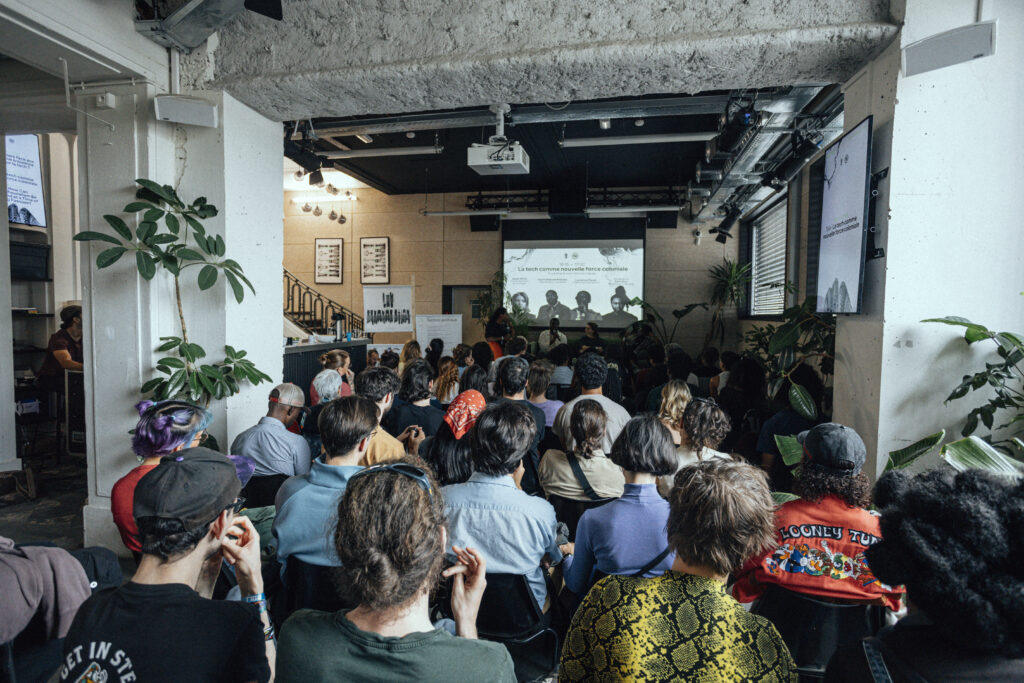
Nuits sonores Lab
Techno-politics
May 28 – June 1st 2025
Hôtel71 · H7 · Grandes Locos, Lyon
At the heart of Les Grandes Locos and Hôtel71, Nuits sonores Lab 2025 unfolded its program around the theme of “Techno-Politics.”
The Nuits sonores and European Lab teams extend a heartfelt thank you to all the speakers, our partners, and the audiences who took part in these conversations and discussions.
Over four days, 70 speakers took part in decoding the power alliances between Big Tech and politics — from techno-colonialism to data protection, from the future of artificial intelligence to the geopolitical influence of technology.
Alongside its main theme, Nuits sonores Lab continues each year to champion an international, diverse, and engaged program, with a spotlight on the independent cultural sector. This 2025 edition gave a voice to scenes under oppression, from Georgia to Palestine, highlighting struggles against imperialism and silencing of peoples.
Stay tuned — podcasts of the talks will be available soon!
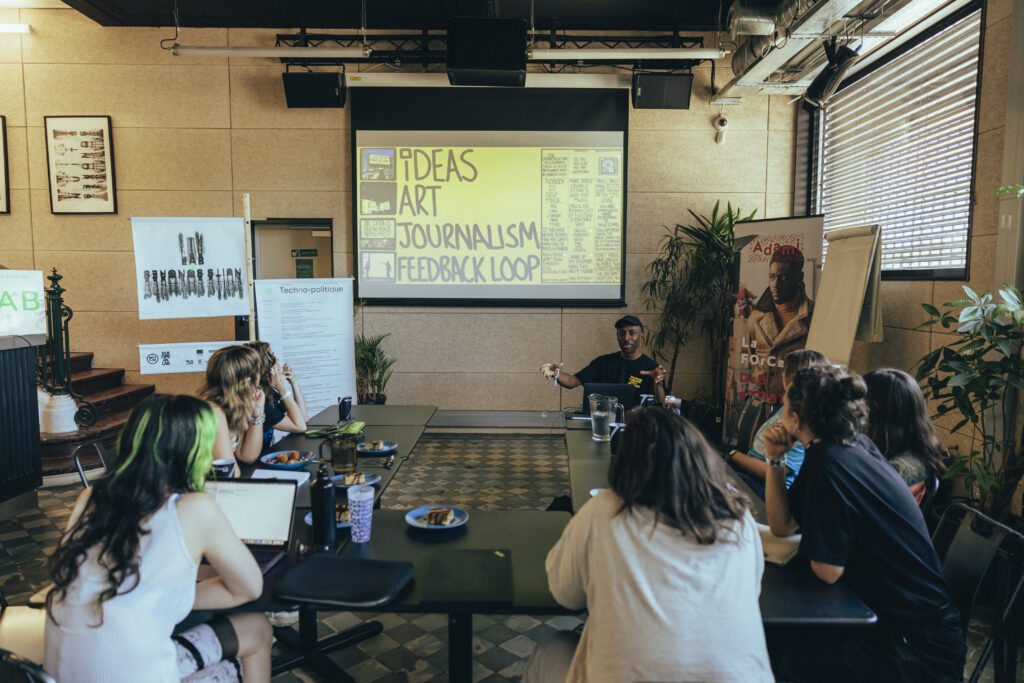
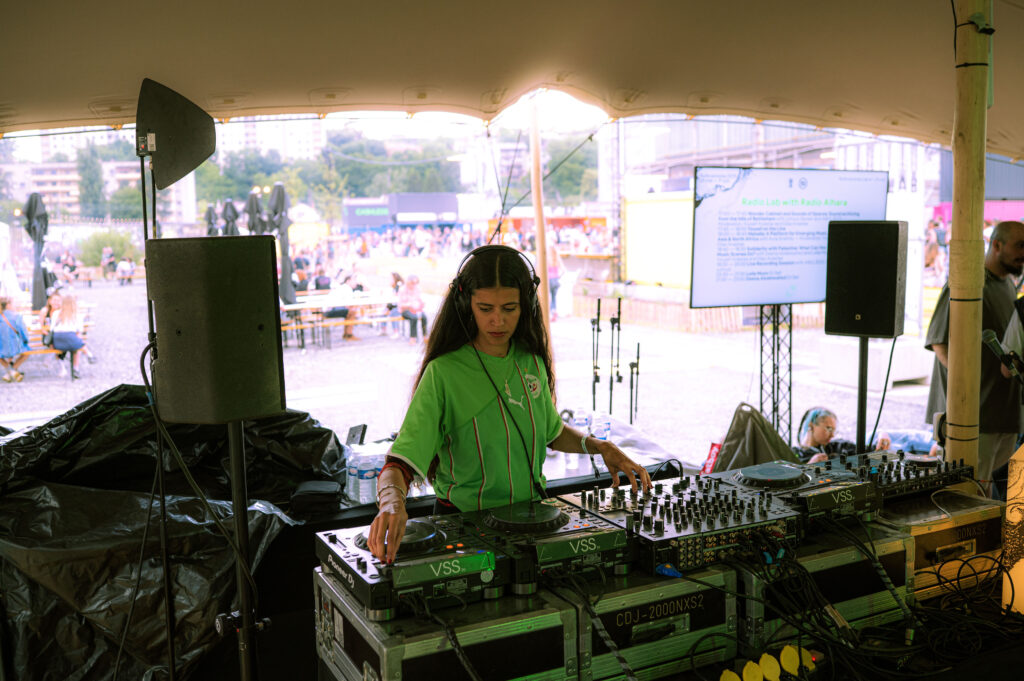
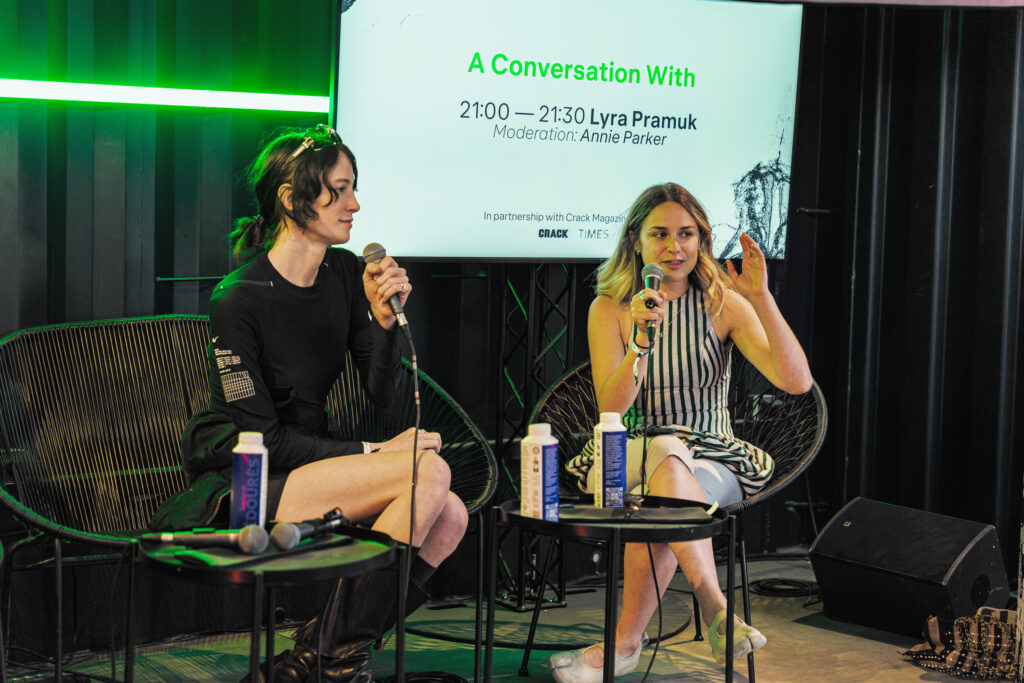
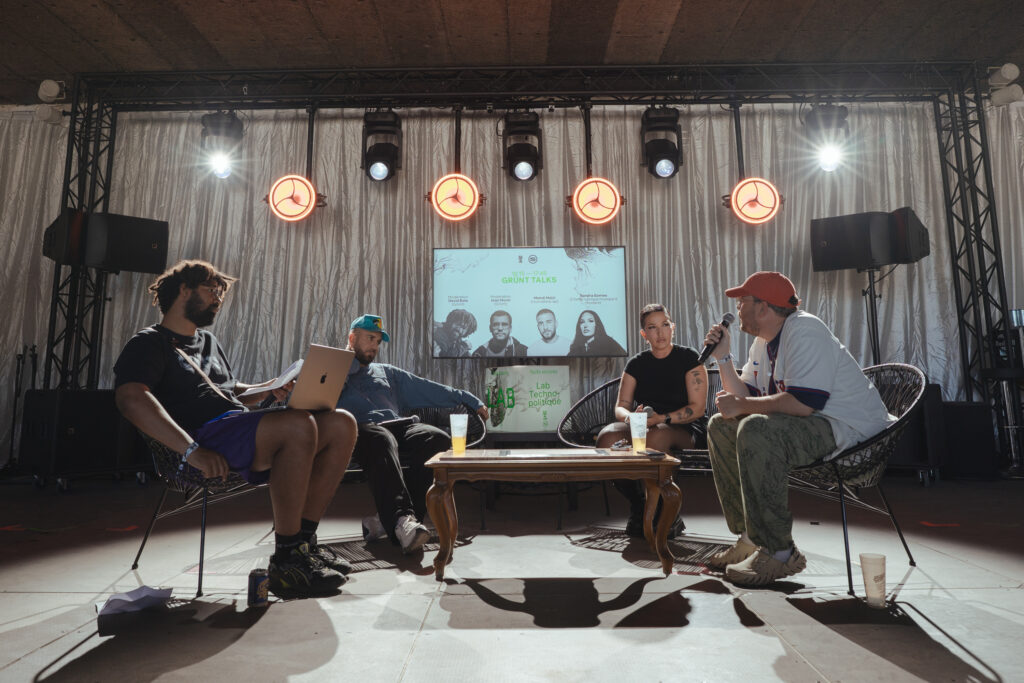
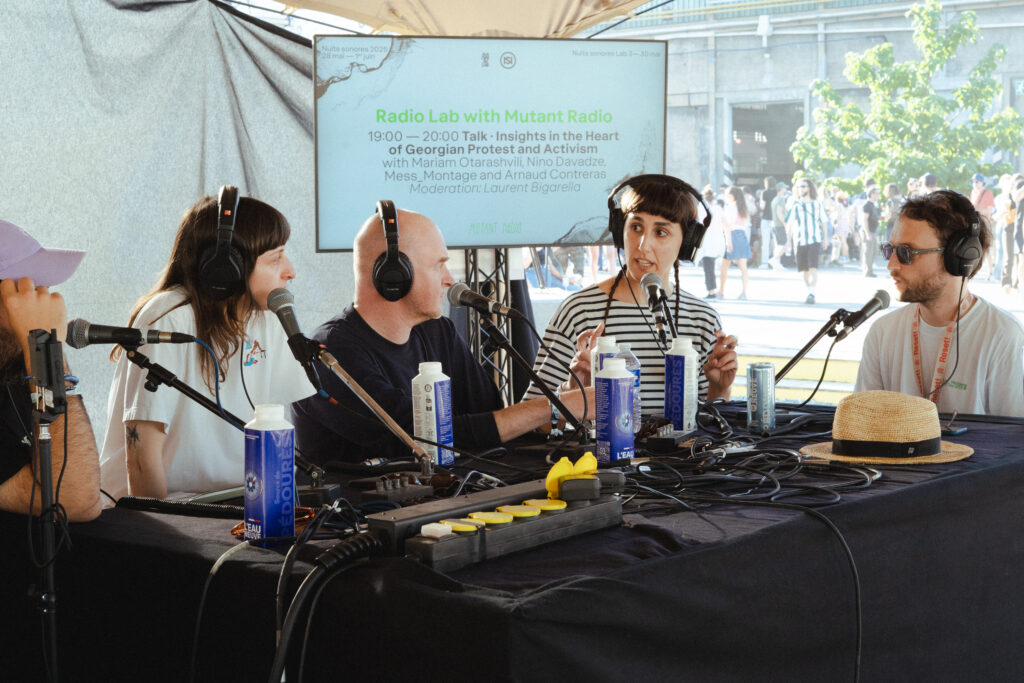
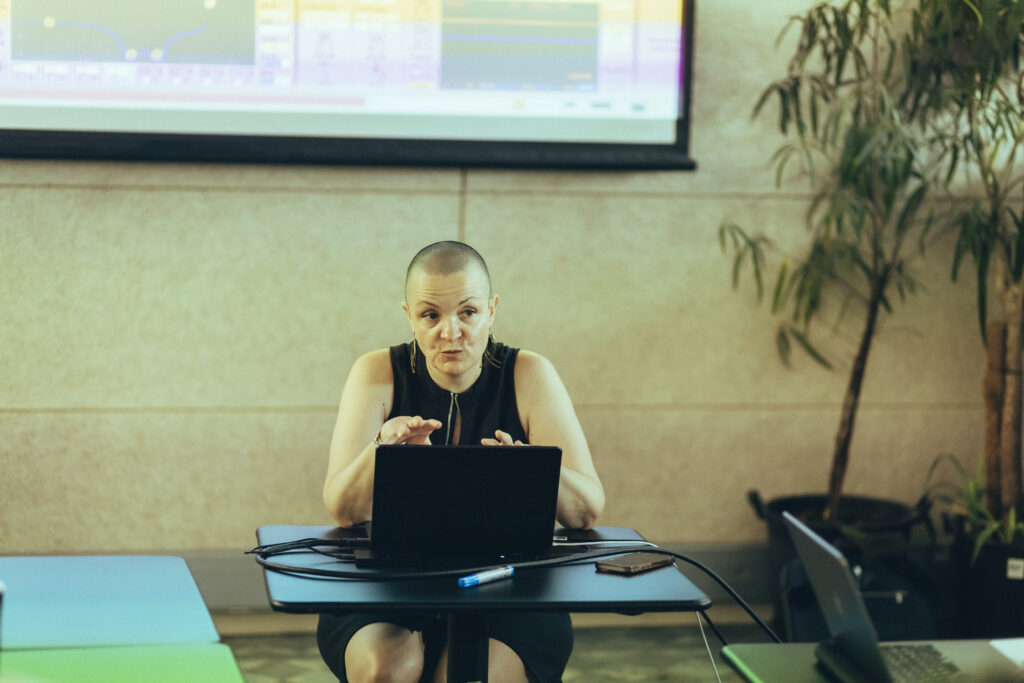
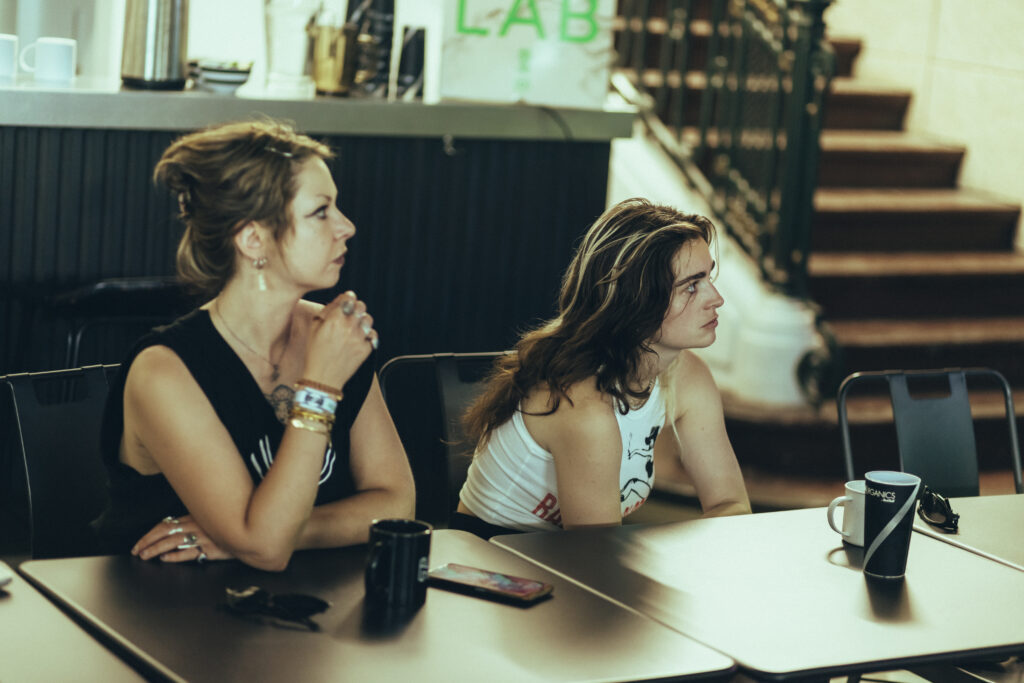
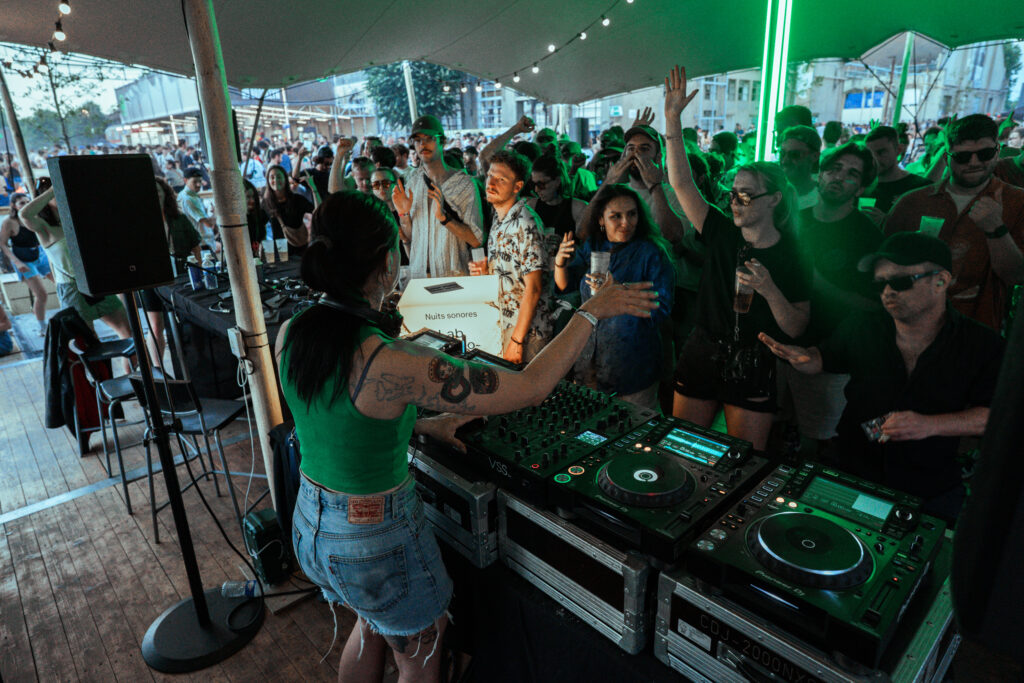

-
Wednesday 28 May
-
Thursday 29 May
-
Friday 30 May
-
Saturday 31 May
10:30 —12:30
Workshop · Looking for Alternatives to Web Giants
📍Hôtel71
The MAGMAs (Meta, Apple, Google, Microsoft and Amazon) wield unprecedented technological and financial power, shaping our behaviour and capturing massive amounts of personal data. With 90% of online searches conducted via Google and over 2.5 billion users of YouTube and Instagram by 2023, a handful of companies control access to information and shape public debate through opaque algorithms. This extreme concentration of technology and data threatens our digital freedoms, increases our dependence on private platforms and poses a major risk to our democracies by influencing public debate. Exploitation of data, opaque algorithms, lack of effective regulation: how can we regain control of our digital uses? How can we ensure that people remain the masters of technology, and not the other way round? This workshop will formulate concrete solutions to free ourselves from these web giants. Angie Gaudion, a member of the Framasoft nonprofit, will present free and ethical alternatives to take back control of our digital tools.
with Angie Gaudion (Framasoft | FR)
Workshop in French.
In partnership with TIMES
10:30 —12:30
Workshop · Digital Utopias: Using AI to Create a Dissident TV Show
📍Hôtel71
AI and mainstream media formats —two surprising starting points when it comes to hacking today’s political narratives. And yet? What would it look like to create a dissident TV news show using generative AI tools?
This workshop will invite participants to explore the creative potential of these technologies in crafting new audiovisual narratives.
with Zoé Pasquier (K7 Technosensible | FR)
Workshop in French.
14:30 – 15:45
Talk · Europe Against Web Giants: A Third Way for Tech?
📍Hôtel71
Artificial intelligence has become a global strategic issue, at the heart of the rivalry between the United States and China. Behind the technological advances are emerging logics of power, sovereignty and control, with a direct impact on our societies and democracies. Faced with this growing polarisation, what role can Europe play? Can it exist as a democratic and sovereign third way, or is it condemned to remain a spectator in this unbridled technological race? This panel will explore the major geopolitical issues of AI, from industrial and regulatory strategies to questions of security, governance and control of information in times of crisis. The discussion will be moderated by Nicolas Houguet, a journalist who analyses for Blast the transformations brought about by artificial intelligence and their political and societal consequences.
avec
Angie Gaudion (Framasoft | FR)
Célestine Rabouam (PHD in Geopolitics | FR)
Tariq Krim (Cybernetica | FR)
Moderation : Nicolas Houguet (Blast | FR)
Workshop in French.
16:15-17:30
Talk • Tech as a New Colonial Force
In partnership with
Histoires Crépues
📍Hôtel71
What is techno-colonialism and how can we bring about the struggles for independence that we need? If big tech companies have become empires, it’s because we have been colonised by their technical deployments. In the face of extractive logics—from the extraction of metals and rare earths in the global South to the racist biases of artificial intelligence—digital technology is revealing itself to be a new terrain of colonialism, embodied today in the colonialism of data. This social order, in which the continuous extraction of data generates massive wealth and global inequalities, imposes a social contract in which progress requires us to hand over our information to companies unconditionally. The digitisation of our lives profoundly redefines power relations, reminding us that capitalism, intrinsically linked to colonialism, exploits our lives, as Achille Mbembe pointed out: ‘We are the ore that our objects are responsible for extracting’. Moderated by Histoires Crépues, this panel will provide a platform for reflection on the new digital challenges in the decolonial struggle.
with
Assia Wirth (PHD in Sociology | FR)
David Maenda Kithoko (Génération Lumière | CD)
Laurence Meyer (Weaving Liberation | FR)
Moderation : Seumboy (Histoires Crépues | FR)
Talk in French.
18:00-19:30
Talk • How Can Techno-Feudalism Be Countered at a Time of Rising Fascism?
📍Hôtel71
‘Capitalism is dead. Now we have something much worse’. For Yanis Varoufakis, Greek economist, capitalism has mutated into a technologically advanced form of feudalism. The ruling class is no longer based on ownership of the means of production, but on cloud capital: sprawling platforms where a few billionaires extract exorbitant rents from the data and engagement of Internet users, while shaping public debate. This project is not just economic, it is also political. 2025 opens with a shocking image: Elon Musk giving two Nazi salutes at the inauguration of the President of the United States. A symbol of the rise of global fascism, financed and amplified by tech. Meta and Spotify are investing in Trump, algorithms are promoting radicalisation, and disinformation is spreading unhindered.
From Trump to Putin, from Modi to Milei, a fascist international is growing stronger, advocating identitarianism, the rejection of minorities and the dismantling of institutions. In France, the Rassemblement National is exploiting the flaws in the platforms to extend its influence. How can we counter this alliance between big tech and far-right ideas? What is exactly the role of AI in this alliance? What can we do to regain control of our digital spaces and protect democracy? This talk will analyse the mechanisms of contemporary fascism and explore strategies of resistance to this new era of techno-feudalism.
with
Maya Kandel (Independent Researcher associated with the Université Sorbonne Nouvelle | FR)
Leevi Saari (AI Now Institute | NL),
Tariq Krim (Cybernetica | FR)
Moderation : Cassandre Begous (Casscendres | FR)
Talk in French.
18:00-21:30
A Conversation With • Resident Advisor
📍Les Grandes Locos
Resident Advisor is coming back to Nuits sonores Lab for three interviews with artists from the festivals moderated by journalist and DJ Chloe Lula.
with
18:00 – 18:30 | Jennifer Cardini
19:30 – 20:00 | Speedy J
21:00 – 21:30 | Dianarchist & Sharona Lico
Moderation : Chloe Lula (Resident Advisor | US / DE)
10:30 — 12:30
Workshop · Independent Artists in the Age of Algorithms
📍Hôtel71
In an era where Big Tech dictates visibility, how can independent artists and cultural workers build sustainable, self-determined careers, and reclaim their narratives? During this capacity-building workshop, Elijah will share insights from his Yellow Squares project, exploring alternative strategies for creating, connecting and thriving beyond algorithms. This workshop will equip participants with practical tools to harness digital platforms without being controlled by them, fostering resilience, ownership, and community-driven momentum in the face of techno-feudal dominance.
with Elijah (Author & DJ | UK)
10:30 — 12:30
Democracy in Darkness : Politics of the Club
📍Hôtel71
In these dark political times, democracy is being reinvented—not in parliaments or institutions, but in the darkness of the club. As the bassline pulses and bodies move in unison—or in chaotic defiance—European club culture reveals itself as more than just a space for escape. These nocturnal worlds function as alternative political microcosms where, for a fleeting moment, new forms of governance emerge: self-regulation replaces surveillance, trust outweighs control, and collective euphoria dissolves social divisions—if only for a night.
Philosophers like Nina Power and Hakim Bey describe clubs as Temporary Autonomous Zones, ephemeral spaces where alternative social structures take shape, challenging dominant power dynamics. Within these zones, authority is fluid, unwritten codes dictate behavior, and solidarity becomes a form of resistance.
As authoritarianism rises and democracies are increasingly threatened by algorithmic control, disinformation, and polarization, we turn to the club as a utopian experiment, exploring its role as a breeding ground for resilient democratic practices.
Could the principles of club culture—fluid hierarchies, radical inclusivity, self-organization—offer a blueprint for strengthening democracy in an era of digital surveillance and corporate control? How do these nocturnal spaces navigate the tension between freedom and regulation? And what can they teach us about resisting systems of power?
This interactive session will examine what underground nightlife reveals about governance, autonomy, and collective responsibility. Participants will map the politics of the club, exploring how its ethos of self-governance and communal trust can inspire new democratic strategies. Can these fleeting, self-sustaining communities of the night inspire real-world political engagement by day?
with Floris Rijssenbeek (DE/MO | NL)
Jochem Jordaan (DE/MO | NL)
Dylan Ahern (DE/MO | NL)
In partnership with Reset! network.
14:30 – 15:45
Talk · Are We Discussing More Electronic Music Than Experiencing It In 2025?
📍Hôtel71
Ten years ago, festivals featuring talks and panel discussions were a minority in the event landscape. Today, they are numerous—perhaps even dominant. The media ecosystem surrounding this culture has also expanded significantly. Podcasts, newsletters, Instagram and TikTok pages: the platforms for dissecting
the dynamics of the “electronic scene” have multiplied, offering new opportunities for many observers, journalists, and enthusiasts to contribute to the conversation. This shift has been accompanied by a growing body of literature on the subject, with an increasing number of essays, theses, and even novels exploring these topics.
At the same time, are we witnessing a decline in club practices? And a growing disinterest among younger generations in nightlife? Some weak signals, reports, and observations—such as those highlighted by journalist Chal Ravens—seem to suggest so. This has led her to write in The Quietus that we are witnessing a form of “Academisation of Rave.”
As part of the Nuits sonores Lab debate forum, she will discuss this ambivalence alongside Elijah, a keen observer of music industry trends who deciphers them through his Yellow Square project, as well as Günseli Yalcinkaya, author and researcher.
with Elijah (Author & DJ | UK)
Chal Ravens (Music critic | UK)
Günseli Yalcinkaya (Researcher | TR / UK)
Moderation: Felipe Maïa (Journalist | BR)
16:15 – 17:30
Keynote · Raising Awareness of the Continuum of Gender-Based Violence in the Nightlife Ecosystem
📍Hôtel71
Launched in October 2023, the initiative Reinventing the Night (Réinventer la nuit) brings together artists and activist organizations (Consentis & Au-delà du club) to create a support network and tools dedicated to combating gender-based and discriminatory violence in the nightlife & music industry. To break the isolation caused by such violence, monthly talking circles for gender-minoritized (cis women, trans, and non-binary people) DJs and professionals of the music industry have been held at Point Éphémère (Paris) for over a year. These circles are designed as a political tool for care and empowerment, breaking the vicious cycle of silence and isolation. Within Reinvent the night, the collective Au-delà du club conducted an exploratory study to shed light on the intimate and anonymized testimonies shared during these circles. The results will be unveiled for the first time on Thursday 29 May, at Nuits sonores Lab.
with Sarah Gamrani (Au-delà du club | FR)
Célia Texier (Réinventer la Nuit | FR)
Format in French.
18:00 – 18:25
Keynote · A Conversation With Meredith Whittaker
📍Hôtel71
Nuits sonores Lab is opening a discussion with Meredith Whittaker, president of the Signal Foundation, the worldwide messaging application renowned for its data protection. She is also co-founder of the AI Now Institute, an independent research institute equipping the field with expert analysis to challenge and reimagine the current trajectory of AI. During this conversation, Meredith Whittaker presents us with her critical reflections from her position at the heart of tech, the ethics of artificial intelligence, online privacy, social networks and Internet governance.
with
Meredith Whittaker (Foundation Signal / AI Now Institute | US)
Moderation: Tariq Krim (Cybernetica | FR)
18:30 – 19:45
Talk · Techno-surveillance: Tech at the Service of Social Control
📍Hôtel71
At the end of the 18th century, the utilitarian philosopher Jeremy Bentham theorised the panopticon: a prison architecture enabling a guard, housed in a central tower, to observe all the prisoners, locked up in individual cells around the tower, without them being able to know whether they were being observed. Michel Foucault, in Surveiller et punir, took up this theory and extended it to society as a whole, made possible by social control: the individual, constantly under surveillance, becomes docile, anticipating his actions for fear of being observed. Today, under the guise of security and efficiency, techno-surveillance is insidiously redefining our public spaces. Predictive algorithms, facial recognition, automated video surveillance: these technologies are transforming the city into a laboratory for social control. Yet their effectiveness is widely disputed, and their cost and impact on civil liberties are a cause for concern. In particular, the privatisation of security is fuelling a surveillance capitalism that is undermining citizens’ rights. This discussion will explore the political and ethical issues surrounding technopolitics in the age of artificial intelligence: who is monitoring and for what purpose? What dangers do these devices pose when they divert our attention from systemic violence? With Synth Media, we will explore the place of these tools in our societies and the possible resistance to their widespread use.
with Félix Tréguer (Researcher and member of the collective La Quadrature du Net | FR)
Nastasia Hadjadji (Journalist et author | FR)
Moderation : Gerald Holubowicz (Synth Media | FR)
Talk in French.
18:00-21:30
A Conversation With • Crack Magazine
📍Les Grandes Locos
Crack Magazine has teamed up with The Independent Movement for Electronic Scenes (TIMES) to offer three interviews with artists from the Nuits sonores programme and explore their musical worlds. The interviews will be moderated by journalist Annie Parker.
18:00 – 18:30 | James K, Andrea Belosi, Günseli Yalcinkaya
19:30 – 20:00 | Special Request
21:00 – 21:30 | Lyra Pramuk
Modération : Annie Parker (Crack Magazine)
In partnership with TIMES (The Independent Movement for Electronic Scenes)
10:30 — 12:30
Workshop · AI and Open Source in Sound creation: Breaking Free from Big Tech
📍Hôtel71
In this workshop, Matheus Sousa de Freitas, Lucien Basdevant and Félix Lacquement will propose innovative approaches combining art, technology and political and social reflection. From the integration of AI and machine learning tools into hardware set-ups, to the adoption of Csound as a lever for emancipation, in resonance with the concept of techno-feudalism, or the use of AI in computer programming to enrich self-education, this workshop will explore, in a plural and committed vision, how art, technology and social reflection intertwine to open up new avenues of emancipation.
with Matheus Sousa de Freitas (CNSMD | BR)
Lucien Basdevant (CNSMD | FR)
Félix Lacquement (CNSMD | FR)
Workshop in French.
In partnership with TIMES and the CNSMD.
10:30 — 12:30
Workshop · The Internet Is a Horrible Place and I’m Here to Make It Worse
📍Hôtel71
The workshop is inspired by The Kawayoku Inception, the research project by Noura Tafeche that delves into the political-artistic value of cuteness and the permanent status of performativity and hypersexualisation on social media as agents of a growing trend towards the aestheticisation of violence.
The project investigates contemporary digital evanescence, the visual reformulation of violence, unconventional recruitment strategies and militarised entertainment under new taxonomies in research areas ranging from ‘Israeli’ and US military propaganda and recruitment strategies translated into choreographies and dance challenges, to the weeb alt-right imagery intertwined with the fan-art of cute manga, passing through video games and the Second Amendment, gun advocates, war enthusiasts or armies employing anime and kawaii aesthetics and rape culture.
From this research, conducted over four years on popular social media and remote online micro-communities, an archive has been built that catalogues almost 30,000 files (screenshots, memes, posts, videos, etc.) with a ‘geographical map’ of the digital platforms where the phenomenon proliferates.
During the workshop, the artist will guide participants through an intricate network of niche telegram channels, discord servers, popular subreddits, official and fake user accounts and bases, providing them with a strategic toolbox for investigating and analysing fringe Internet communities that are involved, in different ways and degrees, in the production and reproduction of online violence.
In partnership with TIMES, co-curated by Insomnia.
![]()
16:00 – 18:00
Grünt Talks
📍Les Grandes Locos
Grünt and Nuits sonores Lab are teaming up to offer Grünt Talks, a live programme from Nuits sonores and on Twitch, featuring Jean Morel and David Bola discussing the latest news and trends in the rap world.
with
Sandra Gomes (Music Journalist | FR)
Mehdi Maïzi (Journalist, Head of Hip Hop Apple Music | FR)
Jean Morel (Grünt | FR)
David Bola (Grünt | FR)
Programme in French.
In partnership with Grünt.
17:00 – 23:00
Radio Lab · Mutant Radio
📍Les Grandes Locos
Donald Trump insults Zelensky, branding him a “dictator” and blaming Ukraine for the war with Russia. Meanwhile, Elon Musk supports the AfD and allows fake news to spread unchecked on X, amplifying reactionary content. American technocracy is no longer merely shaping public debate, it is destabilising European democracies.
Ukraine and Georgia are on the front lines of a battle fought not only militarily and politically, but also in the information sphere. In Georgia, where traditional media is under constant pressure, protests unfold simultaneously in public squares and on social platform, the last stronghold of independent discourse. But how can resistance persist when the very tools of communication are controlled by corporations that censor, manipulate, and suppress? How do social networks become battlegrounds for self-organisation and mobilisation against authoritarian regimes?
On the cultural front, Ukrainian and Georgian artists create under the constant shadow of war, repression, and instability. Their DIY scenes are not peripheral; they are at the heart of Europe’s cultural resistance. But for these voices to have real impact, transnational solidarities must be built. How can Ukrainian and Georgian artists be better represented? How can their struggles inform broader European movements for artistic independence and cultural self-determination? In a time of growing digital monopolies, rising far-right influence, and shrinking creative freedoms, how do we rethink resistance, reimagine community, and carve out new spaces for artistic and political autonomy?
Leading Tbilisi-based webradio Mutant Radio will stepping out of its famous carriage to broadcast 4 hours of programming from Lyon. A takeover punctuated by discussions, listening sessions and DJ sets focusing on Georgian culture.
17:00 — 18:00 | Listening Session · With Mess_Montage (Musician, Artist, Educator | GE)
18:00 — 19:00 | Talk · Stories of the Ukrainian underground scene
With Diana Berg (Platform Tu | UA) and Nastya Vogan (Artist | UA)
19:00 — 20:00 | Talk · Insights in the heart of Georgian protest and activism
With Nino Davadze (Mutant Radio | GE), Mariam Otarashvili (Mutant Radio | GE), Arnaud Contreras (Radio Producer and Photographer | FR) and Mess_Montage (Musician, Artist, Educator | GE)
Moderated by Laurent Bigarella (Reset! network, Arty Farty | FR)
20:00 — 21:00 | Talk · Representation & Transnational Solidarities
With Nastya Vogan (Artist | UA) and Monster (Oramics | PL)
In partnership with TMLAB
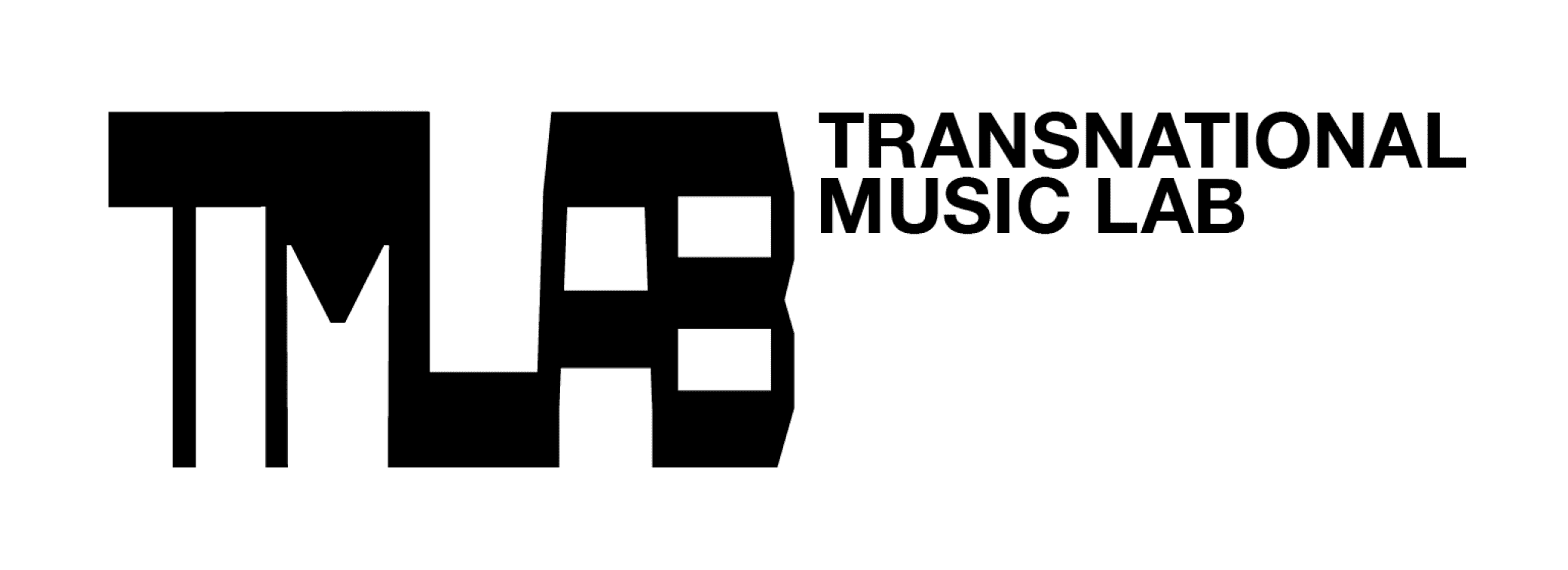
21:00 – 22:00 | Monster (DJ Set)
22:00 – 23:00 | Cornelius Doctor (DJ Set)
14:00 — 15:00
Concert · Les Acousmaflics
The Acousmaflics collective is offering a new live show: Chevaliers Approximatifs. With a live video straight out of the depths of Z cinema, these Chevaliers Approximatifs have something in their wandering that questions us. Their quest for the useless is an ode to average artists, struggling with their little hands against the techno-mullets-rolls-compressors of artistic life.
In partnership with the CNSMD.
17:00 — 23:00
Radio Lab · Radio Alhara
📍Les Grandes Locos
What is the role of sound in archiving disappearing spaces? WonderCabinet, the creative hub hosting Radio Alhara on the hills of Palestine, sought to answer this question through its annual residency, Sound of Spaces. The residency’s first edition focused on capturing the sonic essence of the Cremisan Valley, the last green space surrounding Bethlehem, soon to be annexed by Israel as part of its ongoing settler-colonial project. In response, sonic artists, artisans, designers, visual artists, and the nuns at the Cremisan monastery, to create a repository of sounds that potentially speaks to the spirits of other environments, landscapes, both close by and on the other side of the world.
Behind this initiative stands the same visionary team behind Radio Alhara, the iconic Bethlehem-based webradio, which will take over the radio booth of Nuits Sonores Lab for an exceptional six-hour broadcast. Navigating similar themes, Yousef and Elias Anastas will weave together discussions, listening sessions, and DJ sets to explore the importance of cultural production as a fundamental part of Palestinian resistance to settler-colonialism. It will highlight initiatives that transform sound into a living archive of place and identity, using sonic narratives to reflect on displacement, memory, and resilience. Through this takeover, Radio Alhara will reaffirm its commitment to collective listening and exchange, carving out a space for sonic exploration, storytelling, and artistic defiance.
17:00 — 17:45 | Wonder Cabinet and Sounds of Spaces: Sound archiving from the hills of Bethlehem
With Julmud (Artist | PS), Baraari (Artist | PS) et ABUL3EES (Artist | PS)
Moderated by Yousef Anastas (Radio Alhara | PS) and Elias Anastas (Radio Alhara | PS)
17:45 — 18:00 | Yousef on the line
18:00 — 18:40 | Mahalla: A Platform for Emerging Music from South West Asia & North Africa
With Aura Anahita (Mahalla, curator | FR)
Moderation by Yousef Anastas (Radio Alhara | PS) and Elias Anastas (Radio Alhara | PS)
18:40 — 19:30 | Solidarity with Palestine: What Can the International Music Scenes Do?
With Deena Abdelwahed (Artiste | TN)
Moderated by Yousef Anastas (Radio Alhara | PS) and Elias Anastas (Radio Alhara | PS)
19:30 — 20:30 | Live Recording Session with ABUL3EES, Baraari et Julmud
20:30 — 21:30 | Leila Moon (DJ Set)
21:30 — 23:00 | Deena Abdelwahed (DJ Set)
19:00 — 22:30
A Conversation With · Libération
📍Les Grandes Locos
A Conversation With, the festival’s format for artist interviews, will allow to delve deep into the artists’ musical influences and practices, in collaboration with Libération.
with
19:00 – 19:30 | Julie Ackermann
20:30 – 21:00 | Jwles
22:00 – 22:30 | Suzanne Ciani
Moderation : Marie Klock (Libération | FR)
In partnership with Libération.
Interviews in French.
